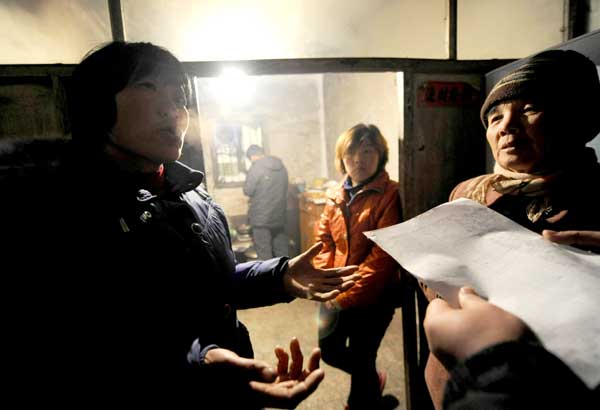Students 'exposed to fumes from chemical plant'
 |
|
Residents in Jianping county, Northeast China's Liaoning province, speak on Thursday about the mass poisoning that took place at local schools in 2008. [Photo/Xinhua] |
BEIJING - A mass poisoning incident two years ago at a high school in Jianping county, Northeast China's Liaoning province, is back in the headlines after affected families sought to sue local government departments for poorly handling the incident and dodging their repeated requests for transparency.
The original incident took place on Oct 18, 2008, when scores of students at Zhangjiayingzi School in Jianping county fell ill and exhibited symptoms of dizziness, fever and vomiting.
The poison scare, allegedly caused by the inhalation of furfural from a chemical plant nearby, lasted for almost a week and led to more than 300 students being hospitalized.
A similar incident previously took place in May 2008 at a primary school in the neighboring village of Beishan, where a dozen students exhibited the same symptoms.
Residents were quick to point out that a manufacturer of furfural, a chemical used as both a solvent and a fungicide, is located within 1 kilometer of both schools and may have been responsible for the two incidents, but government authorities dismissed the claim.
However, the residents' suspicions were not unfounded. The factory began operating in 2008 without receiving formal approval from the local environmental protection bureau, according to earlier reports.
The government's investigation of the poisoning incidents concluded that the students became ill after drinking unsanitary water at school.
The inhalation of furfural can be toxic to some people. Nevertheless, furfural content was not included as an indicator of environmental pollution during the course of the investigation, thereby clearing the factory of any responsibility in the poisoning cases.
In an open letter to concerned residents dated Sept 21, 2009, the government of Zhangjiayingzi township said the furfural plant had met environmental standards and did not pose a threat to people's health.
The affected families remained unconvinced and dissatisfied with the findings of the investigation, demanding more clarity and transparency with the government's investigation, especially regarding the test results of the drinking water at the schools.
Their requests have repeatedly been dismissed over the past two years by the environmental protection authorities and other government departments.
Some of them tried to bring the case to court and were repeatedly rejected by the local primary court as well as the appeal court.
"What we see is government inaction. The factory is allowed to continue operating and we keep breathing toxic air," said Beishan village resident Sun Xuefu.
The 60-year-old's granddaughter was a student at Beishan Primary School, where the smaller-scale poisoning occurred in May 2008.
Although the 12-year-old girl did not take ill like some of the other students, the family was scared by the incident and sent her to study in another city where her father works as a migrant.
Since the incident at Zhangjiayingzi School, student enrolment has dropped from 1,000 to 500 today, with about 200 students opting to transfer to other schools out of concern for their health due to the furfural plant, Sun said.
"What is really disappointing is that the government has ignored our concerns and refused to provide any information on the investigation results to justify their conclusion," he added.
Sun, who is one of the leading representatives of the affected families seeking to sue the relevant government departments, said: "We want two things: compensation and removal of the factory."
Dai Renhui, a Beijing-based lawyer representing the residents, said the local government and the court system had denied the residents' their basic right to be informed, to file a lawsuit against government departments and to appeal.
Dai said the local government should not continue to ignore the residents' requests regarding the water test results of the poisoning incidents.
As of press time on Sunday, officials from the Jianping county environmental protection bureau could not be reached for comment.
Li Yao and Cao Yin contributed to this story.